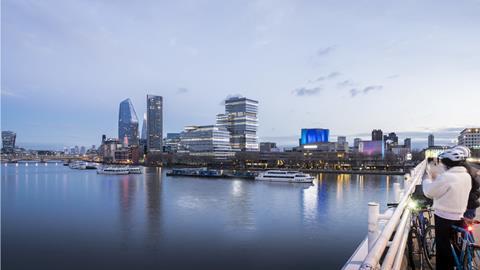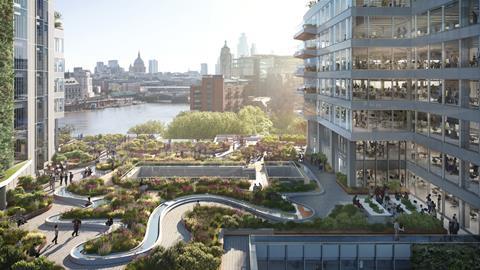Developers say benefits of proposals outweigh heritage harms
Make’s controversial plans to redevelop the former ITV studios have been branded “inappropriate, out of context and harmful” to its South Bank setting at the opening of a public inquiry into the proposals.
Developed by CO-RE and Mitsubishi Estate, the office-led scheme was sent to the planning inspectorate in September by then-communities secretary Greg Clark, who overruled the approvals given by Lambeth council and Mayor of London Sadiq Khan.
The proposals, which would see the existing buildings flattened and replaced by a 26-storey tower linked to a 13-storey block, are being opposed at the inquiry by the Waterloo Community Development Group (WCDG) and Coin Street Community Builders.

The size and appearance of the scheme, named 72 Upper Ground, is likely to play a major part in the inquiry, due to the proposed development‚Äôs prominent position on the Thames and its proximity to the grade II*-listed National Theatre and the grade II-listed IBM ∫⁄∂¥…Á«¯.
In his opening statement, WCDG director Michael Ball said it was “very rare that the community comes together so robustly over a development”, stating that it had not happened since the Garden Bridge controversy which saw that scheme pulled more than five years ago.
He said the community was not against building work but wanted new schemes to be “appropriate, contextual, necessary development”, and described how he had been pleased when the pair of developers bought the vacant site for close to £150m in November 2019.
How we got here
Codenamed Project Vista, plans for 72 Upper Ground were approved by Lambeth council in March this year, despite hundreds of objections from locals, including Vauxhall MP Florence Eshalomi and protests from campaign groups.
Days after Lendlease was appointed to carry out the main construction contract on the scheme, then secretary of state Michael Gove placed an Article 31 notice on the council’s decision, preventing works from beginning and allowing further scrutiny.
At the beginning of September, Gove’s successor Clark called in the decision saying the inquiry should consider evidence on the extent to which the plans are “consistent with the government policies for conserving and enhancing the historic environment, particularly in respect of designated heritage assets”.
But he said this turned to frustration after a long period without being engaged by the developers. “By the time we were consulted, all the key decisions had been made,” he said.
Ball accused the developers of “building sideways because constraints dictate that you cannot go any higher”, resulting in a development that is “inappropriate, out of context and harmful and hence of poor design”.
“It’s not the height that is damaging, it is the fatness, the girth that causes the damage […] this is a hulk,” he said.
Rupert Warren KC, speaking on behalf of the developers, said in his opening statement that the proposals had been “informed by the strong horizontality” of the National Theatre and retain a “family resemblance, whilst being clearly different in use and appearance”.

He said that while there may be a “minor detriment” to views of the theatre from Blackfriars Bridge, the addition of the proposals’ “design quality would more than outweigh it”.
Lambeth council’s representative Matthew Reed agreed, saying that the building’s façade treatment was “functional but elegant and understated” and that the overall plans achieved “design excellence”.
He added that the public benefits of the proposals “outweigh the harm to heritage assets” and were in accordance with the development plan “when considered as a whole”.
The inquiry is expected to run until the first week of January next year with a reserve day pencilled in later that month if required.
























No comments yet